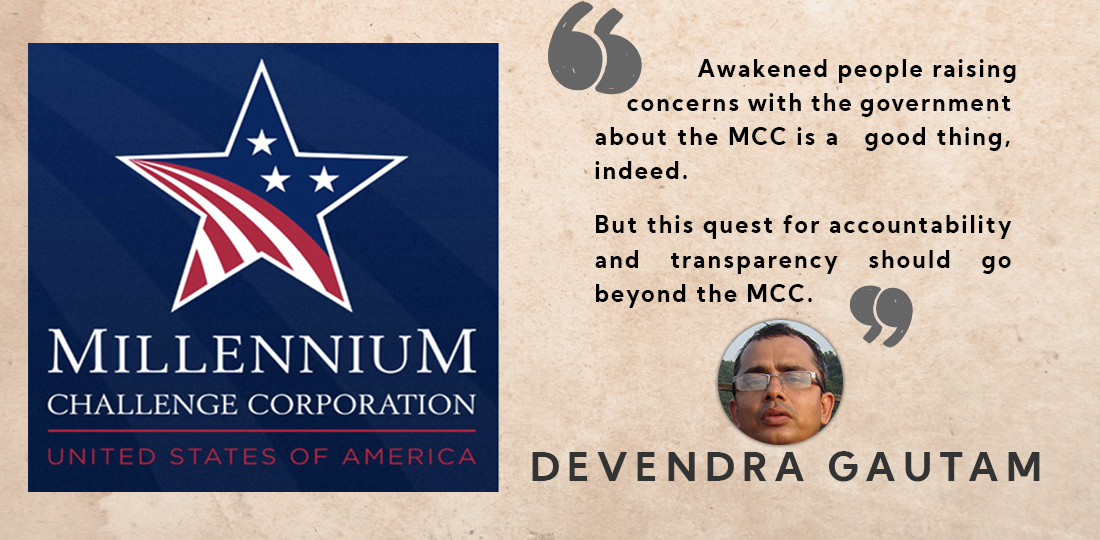Let MCC debate lead us toward light

Yours truly has been consuming quite a lot of stuff on the Millennium Challenge Corporation (MCC) Compact for the past few weeks. This is because the MCC Compact has, for better or worse, emerged as one of the most controversial topics of our times, here in Nepal, with some ‘enlightened minds’ alarming the public that the MCC is more dangerous for Nepal than the East India Company was for India. On the other hand, sharp minds from the pro-MCC camp are arguing that nothing can be further from the truth.
At this point, it is worth recalling that successive governments, despite different ideological leanings, had tried quite hard to keep the whole compact under wraps while trying inconspicuous ways to get the compact through the sovereign parliament, giving objective thinkers something to ponder over. Informed discussions at the people’s level would perhaps have enlightened the public and addressed their concerns about the compact, leaving no room for conspiracy theorists.
This lack of transparency in all things MCC was quite unbecoming of federal secular democratic republican governments, but what can one expect from the politicians, who consider democracy as nothing more than their domestic help?
Then came a handful of public intellectuals and political leaders, who had the nerve to speak their minds about the compact. So, after a series of YouTube interviews, news reports, op-eds, press conferences and public speeches, we the Nepalis know far more about the compact as a whole. Indeed, we have come a long way from the times when the compact was shrouded in mystery.
This late awakening about the MCC compact, yours truly thinks, is a good thing for Nepal and the Nepalis.
For democratic systems to thrive, awakening of the masses is necessary. But this has hardly happened in Nepal where electoral democracy rules. Literally, we wake up only during elections, to cast our votes, in a space of roughly three years (Midterm elections have become the norm rather than the exception in Nepal, which means the voters have to wake up by cutting short their 'sleep' to cast their votes).
Our voting habits are also quite unique.
Many of us vote for a certain party just because our ancestors also voted for it. You are not one of them? No offence intended, but many of us weigh in on the 'direct benefits' we get for choosing a certain political party. Direct benefits may include wads of cash, feasts, promise of a job that may go unfulfilled, lucrative construction contracts, etc.
Staunch loyalists of parties are also there, but their number seems to be dwindling in this day and age of instant gratification.
After casting votes, as yours truly pointed earlier, most of us think that our main duty towards democracy is over. We leave the reins of the country at the hands of political leaders, not bothering to think that this country is too important to be left to politicians alone. This act of leaving the affairs of the state entirely to the politicos is akin to the masses falling asleep in broad daylight. Of course, indoctrinated political cadres remain awake, but their 'wakefulness’ hardly serves any purpose for the larger public as they cannot go beyond their party lines to serve the larger interest of the public.
Indeed, Nepal has paid heavy prices at different periods with the Nepalis leaving the reins of power entirely at the hands of a bunch of politicians by taking them as some sort of saviours.
Despite feeble protests from those who remained somewhat awake, politicos of different hues and colours -- dictators, democrats, socialists and communists -- have compromised national interest with foreign powers to remain in power.
The 1950's peace and friendship treaty with India is a case in point. The Koshi Agreement soon followed, on April 25, 1954, effectively gifting the Koshi river to India at the expense of Nepal and the Nepalis, perhaps in recognition of the role India had played in overthrowing the Rana regime. The Koshi barrage built on the basis of this agreement would turn the sorrow of Bihar into the sorrow of Nepal.
The Gandak agreement soon followed, during the premiership of none other than the democratically-elected BP Koirala, gifting the Gandaki river system to India, despite opposition against this sellout from the constituencies of a sleepy 'democracy'.
In the 1990's, Indian support for political forces waging a struggle against the Panchayat regime did not come for free. The democratically-elected Girija Prasad Koirala swiftly handed over the Mahakali river to the ‘dear neighbor’ by misusing the sovereign parliament, in cahoots with the communists -- CPN-UML -- and the party of the Panchas, the Rastriya Prajatantra Party, despite public protests against the same.
About 13 years ago, Nepal again had to sacrifice national interest for India's support for the abolition of the monarchy and the establishment of a federal secular democratic republic through a 12-point understanding. Over the years, successive governments in Nepal have gone on to gift the Upper Karnali, Arun III and Lower Arun to New Delhi for her support, despite opposition from the subjects of a sleepy republic.
Awakened people raising concerns with the government about the MCC is a good thing, indeed. But this quest for accountability and transparency should go beyond the MCC. The awakened masses should have the audacity to ask the politicians concerned why Nepal was made to lose her pound of flesh after every political transformation. Together, they should have the energy to protest relentlessly against the sellouts mentioned earlier, press the government to seek reparations and revise those deals/treaties in favour of this country and successive generations of Nepalis. If this striving for the correction of historical wrongs leads to knocking off some of the so-called superhumans, the messiahs of democracy, human rights and socialism from their pedestal, so be it.
Let public intellectuals and the select few political leaders known for their intellectuality and integrity -- the rest of the leaders have their places secured in the dustbin of history -- lead the masses and the whole of Nepal towards light from a long tunnel of darkness spanning across time and space.
Gautam is an independent journalist.









Leave Comment